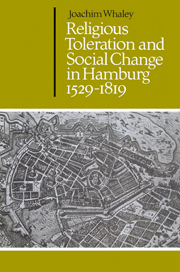Book contents
- Frontmatter
- Contents
- Preface
- Abbreviations
- Illustrations
- Introduction
- 1 The struggle for political stability and purity of belief: Hamburg from Reformation to French Revolution
- 2 The politics of toleration: the Catholic community
- 3 The limits of toleration: Sephardim and Ashkenazim
- 4 The growth of toleration: the Calvinist communities
- 5 Patriotism versus Orthodoxy: the struggle for limited religious freedom, 1760–85
- 6 The image of the city: the search for a tolerant society in early modern Hamburg
- 7 The aftermath
- Bibliography
- Index
1 - The struggle for political stability and purity of belief: Hamburg from Reformation to French Revolution
Published online by Cambridge University Press: 18 September 2009
- Frontmatter
- Contents
- Preface
- Abbreviations
- Illustrations
- Introduction
- 1 The struggle for political stability and purity of belief: Hamburg from Reformation to French Revolution
- 2 The politics of toleration: the Catholic community
- 3 The limits of toleration: Sephardim and Ashkenazim
- 4 The growth of toleration: the Calvinist communities
- 5 Patriotism versus Orthodoxy: the struggle for limited religious freedom, 1760–85
- 6 The image of the city: the search for a tolerant society in early modern Hamburg
- 7 The aftermath
- Bibliography
- Index
Summary
In his survey of the world of the early Enlightenment, Peter Gay wrote: ‘Hamburg, one of many Free Cities in the German Empire, avoided the decay of most of the others by welcoming foreigners of all nationalities and giving them a place in civic and commercial affairs. The… Constitution of 1712, perhaps the least oligarchical urban charter of the age, reflected this liberal spirit and promoted it.’ Gay gives no source for his judgement, but it reflects nonetheless the views of a long line of Hamburg historians beginning around 1800 and culminating in the better-known work of Percy Schramm. After the toleration mandate of 1785, and in the context of the euphoric reforming zeal of the urban elite after the 1790s, the city's historians created a myth of a free mercantile republic whose present wealth and power derived from a long tradition of freedom and toleration. ‘In political and civil terms there is only one estate in Hamburg, the burgher estate’, wrote Johann Daniel Curio in 1802, ‘We are all citizens, no more and no less.’ A decade later Jonas Ludwig von Hess elaborated the myth when he declared:
The people here sometimes abused the non-Lutheran immigrants and made them fear for their lives. Yet one cannot claim that Lutheran Hamburg ever openly persecuted those whom, according to its religious principles, it would have been obliged to regard as heretics. It never deprived them of their honour, their livelihood or their lives. The appearance of intolerance which was formerly attached to the city rarely sprang from a fanatical devotion to the supposed cause of God. If such an intolerance did in fact ever rage in Hamburg, this spirit more truly possessed the minds of the clergy than those of the real citizens.
- Type
- Chapter
- Information
- Publisher: Cambridge University PressPrint publication year: 1985
- 1
- Cited by



